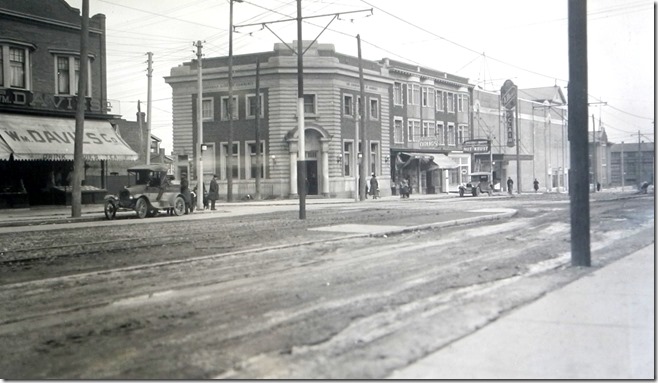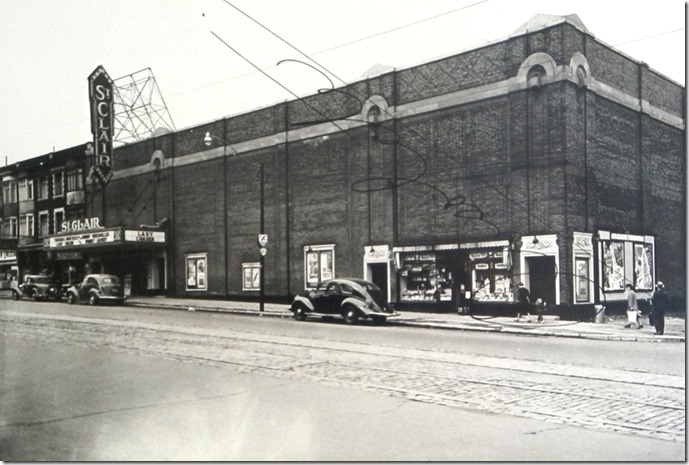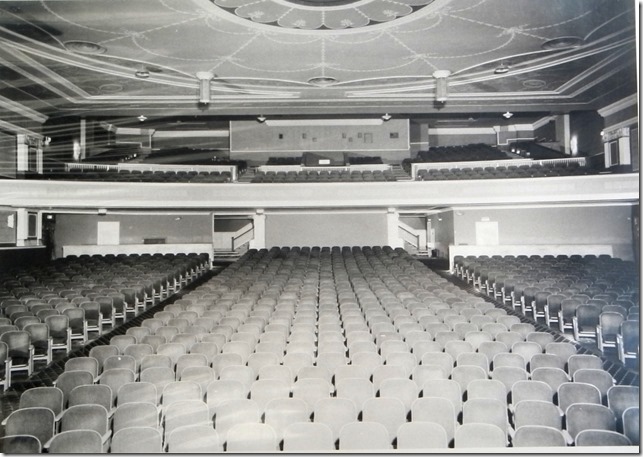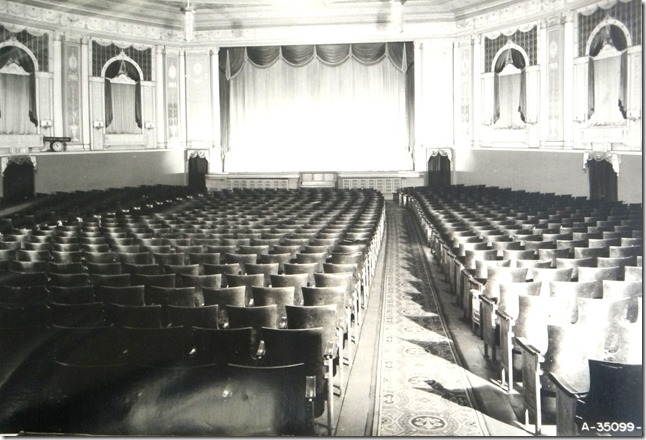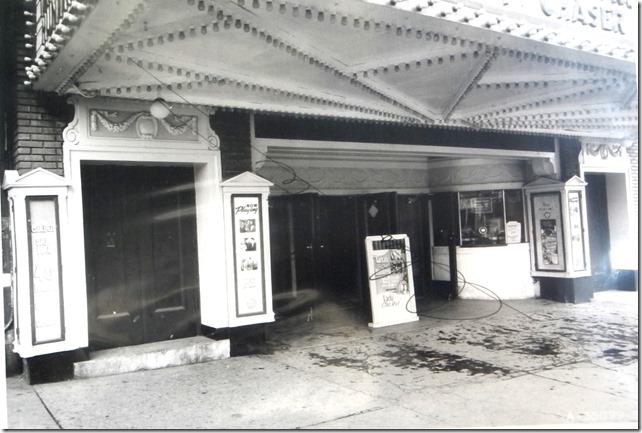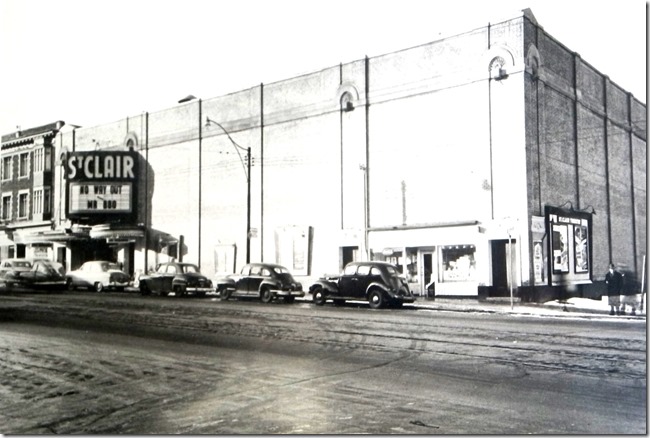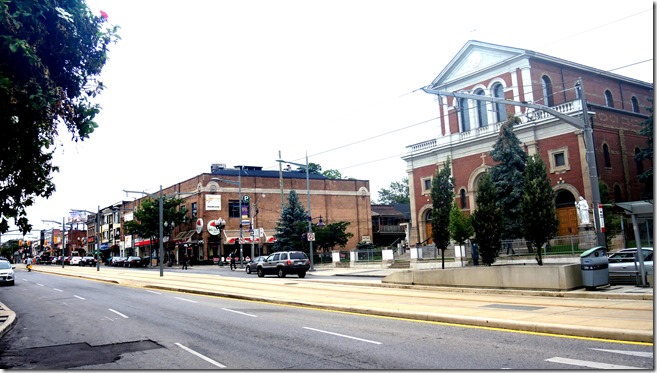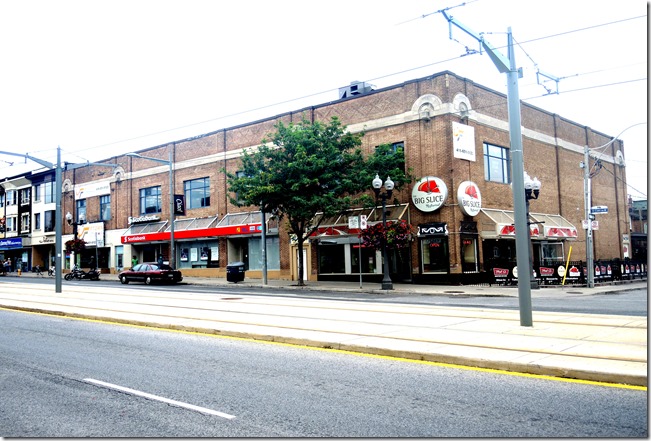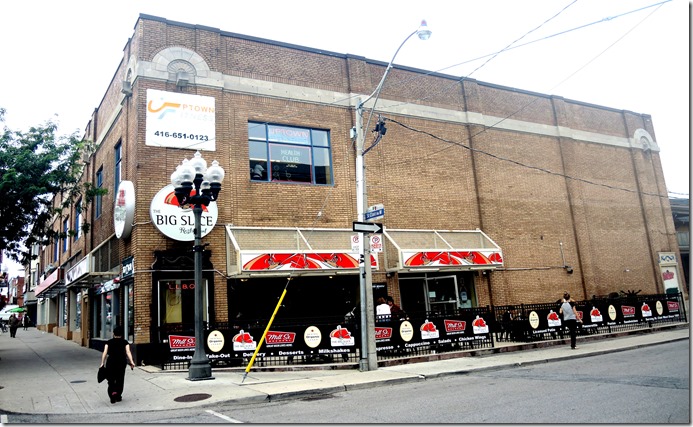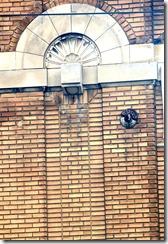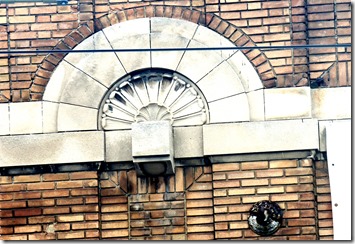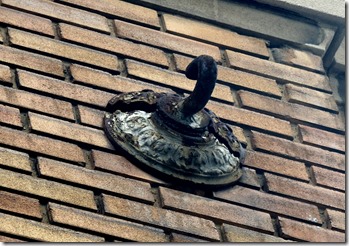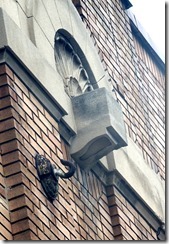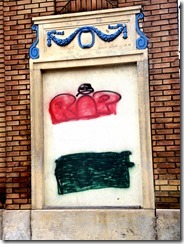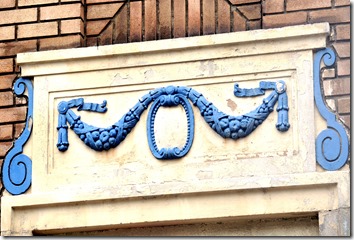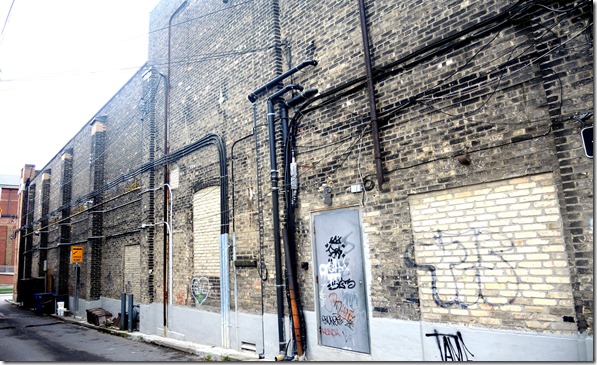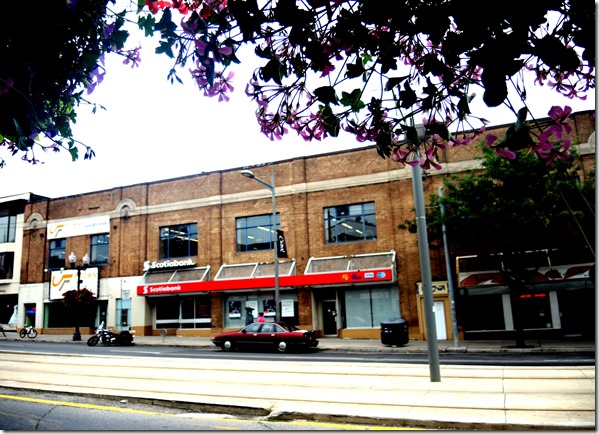The above photo was taken in March of 1921, gazing east along St. Clair Avenue, from a short distance to the west of Dufferin Street. In this decade, the streetcars travelled on their own right-of-way, similar to today. On the northeast corner of St. Clair and Dufferin is the Imperial Bank (it later became the CIBC). To the east of the bank there is a row of shops, and to the east of them is the St. Clair Theatre. To the east of the theatre, partially blocked from view, is St. Clare Roman Catholic Church. This photo is from the City of Toronto Archives, from the Salmon Collection (It. 222).
The St. Clair Theatre was at 1154-56 St. Clair Avenue, near the northeast corner of St. Clair and Dufferin streets. When it opened in 1921, it was in the heart of the shopping district of the suburban community of Earlscourt, an area where many British immigrants resided. As it was an era without TV, and even radio being rare, St. Clair Avenue was “the place” to stroll whenever the weather permitted. Young men cruised the streets for gals, and couples wandered along the avenue, many of them attending the new theatre for an evening’s entertainment. The original plans for the theatre were drawn up in February of 1919 for the Allen Chain, and it opened its doors in 1921. The architect were Hynes, Feldman and Watson. The firm employed a similar design for the Parkdale Theatre on Queen Street.
The yellow-brick St. Clair Theatre was a large structure that dominated the streetscape. It contained 1137 leatherette seats and a balcony that accommodated a further 419 patrons. When it opened, there was no air-conditioning. The license was eventually transferred to Famous Players Corporation. A candy bar was installed in 1947. In 1950 the theatre was extensively renovated and new seats installed. The number of seats on the main floor was reduced to 1030 and the balcony to 400.
On August 14, 1956 a fire broke out at 10:15 pm in the backstage area. There was no panic and the theatre was quickly evacuated. It was discovered that a cigarette in the ushers’ dressing room was the cause of the fire. The damage was slight and the theatre reopened the following day. In the 1960s, because of the demographic changes in the district, the theatre was converted to screening Italian films and the theatre was altered to contain two auditoriums. In 1967, a three-year-old child was discovered inside the auditorium. No one ever determined how the youngster entered the theatre. People were scandalized by the incident as two restricted films were being shown.
Because the theatre auditorium was parallel to the street, after the theatre closed, it was easy to convert the structure to shops that faced the avenue for easy pedestrian access.
Information for this post form the files of the City of Toronto Archives.
The south facade of the St. Clair Theatre. This photo from the City of Toronto Archives (Series 2182-A-35099-1) was likely taken in 1950, since a 1949 Torpedo-back Pontiac is parked outside the theatre.
The orchestra and balcony of the St. Clair Theatre. Photo from the City of Toronto Archives, AO 2179.
View of the interior from the rear of the theatre, looking toward the screen. Photo from the City of Toronto Archives, A0 2178.
Entrance of the St. Clair Theatre. Photo from the City of Toronto Archives, from the collection of the Ontario Archives, AO 2181.
This photo was likely taken about the year 1951, as the film shown on the marque, “No Way Out,” was released in 1950. Photo from the City of Toronto Archives, A0 2183.
View looking west along St. Clair Avenue toward Dufferin Street in September of 2013. The Church of St. Clare is in the foreground, on the northeast corner of St. Clair and Westmount Avenue. The St. Clair Theatre building is to the west (left side)of the church
The old St. Clair Theatre building in September of 2013.
The east facade of the old theatre site on Westmount Avenue. Notice the designs in the stonework near the top of the building.
Views of the detailed stonework on the south facade of the building.
Large brackets that remain on the south facade, which held the chains that supported marquee.
An emergency exit on the east facade that is now cemented over, and the charming detailing above the exit.
The north facade of the theatre in the laneway behind the building, the emergency exits and windows now bricked over (2013).
The old St. Clair Theatre, viewed from the south side of the street in August of 2013.
To view the Home Page for this blog: https://tayloronhistory.com/
To view previous blogs about other movie houses of Toronto—old and new
The Odeon Humber theatre at Bloor and Jane Streets (now Humber Cinemas)
https://tayloronhistory.com/2013/09/30/torontos-architectural-gemsthe-odeon-humber-theatre/
The Oakwood Theatre on Oakwood Avenue, near St. Clair Avenue West
The Biltmore Theatre on Yonge, north of Dundas St.
https://tayloronhistory.com/2013/03/01/torontos-old-movie-housesthe-biltmore-theatre/
The Coronet Theatre on Yonge St. at Gerrard
The Nortown Theatre on Eglinton, west of Bathurst St.
The Radio City Theatre on Bathurst, south of St. Clair.
https://tayloronhistory.com/2013/09/13/torontos-old-movie-housesthe-radio-city-theatre/
The Mount Dennis Theatre on Weston Rd, north of Eglinton
https://tayloronhistory.com/2013/09/27/torontos-old-movie-theatresthe-mount-dennis-on-weston-rd/
The Royal George Theatre on St. Clair W., west of Dufferin Street.
The Colony Theatre at Vaughan Road and Eglinton Avenue
https://tayloronhistory.com/2013/09/10/torontos-old-movie-housesthe-colony-at-eglinton-and-vaughan/
The Runnymede Theatre in the Bloor West Village (now a Chapters/Indigo Book Store)
The Eglinton Theatre
https://tayloronhistory.com/2013/08/28/torontos-architectural-gemsthe-eglinton-theatre/
The magnificent Odeon Carlton at Yonge and Carlton Streets
https://tayloronhistory.com/2013/08/09/torontos-great-old-theatresthe-odeon-carlton/
The Revue Theatre at 400 Roncesvalles Avenue
The Cineplex Odeon Varsity Theatre at Bloor and Bay
https://tayloronhistory.com/2013/06/24/torontos-architectural-gemsthe-cineplex-odeon-varsity/
The “Bloor Hot Docs Cinema” on Bloor Street West
https://tayloronhistory.com/2013/06/09/torontos-architectural-gemsthe-bloor-hot-docs-cinema/
The Vaughan Theatre on St. Clair Avenue
https://tayloronhistory.com/2013/05/15/torontos-lost-treasuresthe-vaughan-theatre-on-st-clair-ave/
Toronto’s first movie screening and its first movie theatre
https://tayloronhistory.com/2013/03/13/torontos-first-movie-screening-and-first-movie-theatre/
The ultra-modern Scotiabank Theatre at Richmond and John Streets
https://tayloronhistory.com/2013/04/04/torontos-architectural-gemsthe-modern-scotiabank-theatre/
Cineplex Theatre at Yonge and Dundas Streets
The Ed Mirvish Theatre (the Pantages, Imperial and Cannon)
The Downtown Theatre (now demolished) at Yonge and Dundas
The Orpheum Theatre on Queen St., west of Bathurst
https://tayloronhistory.com/2013/02/07/torontos-old-movie-theatres-the-orpheum-on-queen-st-w/
The Bellevue Theatre on College Street that became the Lux Burlesque Theatre
https://tayloronhistory.com/2013/01/14/the-bellevue-theatre-lux-burlesque-theatre-on-college-street/
Old movie houses of Toronto
https://tayloronhistory.com/2011/06/27/old-movie-houses-of-toronto/
The Victory burlesque and movie theatre on Spadina at Dundas:
https://tayloronhistory.com/2012/09/08/the-sinful-victory-burlesque-theatre-at-dundas-and-spadina/
The Shea’s Hippodrome Theatre on Bay St. near Queen
Attending a matinee in the old movie houses of Toronto during the “golden age of cinema”
The University Theatre on Bloor St., west of Bay Street.
https://tayloronhistory.com/2012/02/24/the-opening-of-torontos-university-theatre-on-bloor-street/
Archival photos of the Imperial and Downtown Theatres on Yonge Street
The Elgin/Winter/Garden Theatres on Yonge Street
https://tayloronhistory.com/2012/05/31/torontos-architectural-gemsthe-elgin-winter-garden-theatres/
The now vanished Avon Theatre at 1092 Queen Street West
https://tayloronhistory.com/2012/12/10/torontos-lost-movie-theatresthe-avon-at-1092-queen-west/
To view other posts about the history of Toronto and its buildings:
The Ellis Building on Adelaide Street near Spadina Ave.
The Heintzman Building on Yonge Street, next to the Elgin Theatre
The tall narrow building at 242 Yonge Street, south of Dundas
https://tayloronhistory.com/2013/07/10/torontos-architectural-gems242-yonge-st-south-of-dundas/
Toronto’s first Reference Library at College and St. George Streets.
The Commodore Building at 315-317 Adelaide St. West
The Graphic Arts Building (condo) on Richmond Street
The Art Deco Victory Building on Richmond Street
The Concourse Building on Adelaide Street
The old Bank of Commerce at 197 Yonge Street
The Traders Bank on Yonge Street—the city’s second skyscraper
https://tayloronhistory.com/2013/05/22/torontos-architectural-gemstraders-bank-on-yonge-st/
Toronto’s old Union Station on Front Street, built in 1884
https://tayloronhistory.com/2013/05/18/torontos-lost-architectural-gemsthe-old-union-station/
St. Andrew’s Presbyterian Church at King and Simcoe Streets.
https://tayloronhistory.com/2013/05/13/torontos-architectural-gemshistoric-st-andrews-on-king-st/
The row houses on Glasgow Street, near Spadina and College Streets
https://tayloronhistory.com/2013/05/10/torontos-architectural-gemsrow-houses-on-glasgow-st/
The bank at Queen and Simcoe that resembles a Greek temple
The cenotaph at Toronto’s Old City Hall
https://tayloronhistory.com/2013/04/09/torontos-architectural-gemscenotaph-at-old-city-hall/
The magnificent Metropolitan Cathedral at King East and Church Streets
https://tayloronhistory.com/2013/04/02/torontos-architectural-gemsmetropolitan-cathedral/
St. Stanislaus Koska RC Church on Denison Avenue, north of Queen West
The historical St. Mary’s Church at Adelaide and Bathurst Streets
The Bishop’s (St, Michael’s) Palace on Church Street, Toronto
https://tayloronhistory.com/2013/03/02/torontos-architectural-gemsbishops-palace-on-church-street/
The Union Building at Simcoe and King Street West
https://tayloronhistory.com/2013/03/30/torontos-architectural-gemsthe-union-building-on-king-st/
The Ed Mirvish (Pantages, Imperial, Canon) Theatre, a true architectural gem on Toronto’s Yonge Street
The Waverly Hotel on Spadina near College Street.
https://tayloronhistory.com/2013/02/16/toronto-architectural-gemsthe-waverly-hotel-484-spadina/
The Art Deco Bank of Commerce building on King Street West.
The Postal Delivery Building, now the Air Canada Centre (ACC)
The Bellevue Fire Station on College Street
https://tayloronhistory.com/2013/02/14/torontos-architectural-gems-bellevue-fire-station/
The Bank of Nova Scotia at King and Bay Streets
Toronto’s old Sunnyside Beach
https://tayloronhistory.com/2013/02/01/a-pictorial-journey-to-sunnyside-beach-of-old-part-one/
https://tayloronhistory.com/2013/02/03/a-pictorial-journey-to-torontos-old-sunnyside-beach-part-two/
Toronto’s architectural gems—the Runnymede Library
https://tayloronhistory.com/2013/02/05/torontos-architectural-gems-runnymede-library/
Spadina Avenue – sinful, spicy and diverse
https://tayloronhistory.com/2012/09/28/sinfully-saucy-and-diversetorontos-spadina-avenue/
The Reading Building, a warehouse loft on Spadina Avenue
https://tayloronhistory.com/2013/01/20/torontos-architectural-gemsthe-reading-building-on-spadina/
The Darling Building on Spadina Avenue
https://tayloronhistory.com/2013/01/19/torontos-architectural-gemsthe-darling-building-on-spadina/
The amazing Fashion Building on Spadina Avenue
Toronto’s architectural gems – the Tower Building at Spadina and Adelaide Street
The Balfour Building at 119 Spadina Avenue
The Robertson Building at 215 Spadina that houses the Dark Horse Espresso Bar
An architectural gem – Grossman’s Tavern at Spadina and Cecil Streets
https://tayloronhistory.com/2012/11/08/architectural-gem-grossmans-tavern-at-377-9-spadina/Historic
History of the house that contains the Paul Magder Fur Shop at 202 Spadina
An important historic building that disappeared from the northeast corner of Spadina and College
Historic bank building on northeast corner of Spadina and Queen West
https://tayloronhistory.com/2012/12/02/torontos-architectural-gemsbank-at-spadina-and-queen-west/
History of the Backpackers’ Hotel at King and Spadina
https://tayloronhistory.com/2012/03/31/history-of-the-backpackers-hotel-at-king-and-spadina/
Hamburger corner – Spadina and Queen Streets
https://tayloronhistory.com/2012/10/10/torontos-hamburger-cornerwhere-is-it-and-why/
Lord Lansdowne Public School on Spadina Crescent
The Victory Burlesque Theatre at Dundas and Spadina
https://tayloronhistory.com/2012/09/08/the-sinful-victory-burlesque-theatre-at-dundas-and-spadina/
The Dragon City Mall on the southwest corner of Dundas and Spadina
https://tayloronhistory.com/2012/08/25/torontos-heritage-the-southwest-corner-of-queen-and-spadina/
Buildings on the west side of Spadina a short distance north of Queen Street.
History of the site of the Mcdonalds on northwest corner of Queen and Spadina
https://tayloronhistory.com/2012/08/27/mcdonalds-at-queen-and-spadina-on-an-historic-site/
A former mansion at 235 Spadina that is now almost hidden from view.
ttps://tayloronhistory.wordpress.com/2012/07/04/torontos-architectural-gems-is-this-one-a-joke/
Military hero of the War of 1812 lived near corner of Spadina and Queen West.
The Art Deco bus terminal at Bay and Dundas Streets.
Photos of the surroundings of the CN Tower and and the St. Lawrence Market in 1977
The old Dominion Bank Building at King and Yonge Street
The Canada Life Building on University and Queen Street West.
Campbell House at the corner of Queen Street West and University Avenue
A study of Osgoode Hall
https://tayloronhistory.com/2012/04/12/enjoying-torontos-architectural-gems-osgoode-hall/
Toronto’s first City Hall, now a part of the St. Lawrence Market
Toronto’s Draper Street, a time-tunnel into the 19th century
The Black Bull Tavern at Queen and Soho Streets, established in 1822
History of the 1867 fence around Osgoode Hall on Queen Street West at York Street
Gathering around the radio as a child in the 1940s
The opening of the University Theatre on Bloor Street, west of Bay St.
https://tayloronhistory.com/2012/02/24/the-opening-of-torontos-university-theatre-on-bloor-street/
122 persons perish in the Noronic Disaster on Toronto’s waterfront in 1949
Historic Victoria Memorial Square where Toronto’s first cemetery was located, now hidden amid the Entertainment District
https://tayloronhistory.com/2012/01/09/victoria-square-in-torontos-entertainment-district-is-a-gem/
Visiting one of Toronto’s best preserved 19th-century streets-Willcocks Avenue
The 1930s Water Maintenance Building on Brant Street, north of St. Andrew’s Park
Toronto’s architectural gems-photos of the Old City from a book published by the city in 1912
Toronto’s architectural gems in 1912
https://tayloronhistory.com/2012/12/04/torontos-architectural-gems-in-1912/
Toronto’s architectural gems – the bank on the northeast corner of Queen West and Spadina
https://tayloronhistory.com/2012/12/02/torontos-architectural-gemsbank-at-spadina-and-queen-west/
Photos of the surroundings of the CN Tower and and the St. Lawrence Market in 1977
The St. Lawrence Hall on King Street
https://tayloronhistory.com/2012/04/28/enjoying-torontos-architectural-gems-the-st-lawrence-hall/
Toronto’s streetcars through the past decades
https://tayloronhistory.com/2012/03/26/memories-of-torontos-streetcars-of-yesteryear/
History of Trinity Bellwoods Park
https://tayloronhistory.com/2012/04/09/the-history-and-beauty-of-trinity-bellwood-park/
A history of Toronto’s famous ferry boats to the Toronto Islands
.
